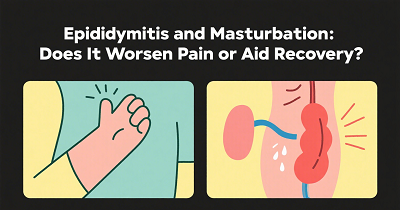Masturbation During Epididymitis: Does It Worsen Pain or Aid Recovery?
At the urology clinic, 30-year-old Carter came in wincing with severe lower abdominal pain. He described how, just three days after being diagnosed with acute epididymitis, he gave in to sexual urges and masturbated. That night, his scrotum became more swollen and painful, and he developed a high fever and chills. A medical exam revealed a testicular abscess, which ultimately required surgical drainage.

Unfortunately, Carter's case is far from unique. Epididymitis is a common inflammatory condition of the male reproductive system, the management of sexual activity—particularly the control of masturbation—during epididymitis has long been a critical factor affecting treatment outcomes.
The Pros and Cons of Masturbation
Masturbation is not a monster, and moderate masturbation does little harm to the body. It may even help alleviate conditions such as prostatitis. Experts point out that occasional masturbation can cause temporary congestion of the prostate, which is relieved after ejaculation, thereby reducing bacterial presence in the prostate and benefiting prostate health. However, excessive masturbation may lead to sexual dysfunctions such as premature ejaculation, ejaculatory disorders, and erectile dysfunction. Excessive stimulation keeps the nervous system in a heightened state, which can lead to fatigue and impair both erection and ejaculation function.
Is Masturbation Advisable During Epididymitis
For patients with epididymitis, whether masturbation is permissible depends on the specific stage and condition of the illness:
Epididymitis in the active phase
During the active phase of epididymitis, the epididymis is already inflamed and in a relatively unhealthy state. Masturbation at this time may lead to several adverse effects. First, it can cause congestion and swelling of the reproductive organs, exacerbating the inflammatory response in the epididymis and hindering recovery. Second, if proper hygiene is not maintained during masturbation, it may introduce bacteria or other pathogens, leading to retrograde infections, spreading or worsening the inflammation, and potentially causing other urogenital infections.
Additionally, frequent masturbation may weaken the immune system, and a compromised immune system can slow the recovery process of chronic epididymitis, creating a vicious cycle. Therefore, patients should avoid masturbation during the active phase of the disease, and other forms of sexual activity are also inadvisable.
Epididymitis in the stable phase
When chronic epididymitis is in the stable phase, meaning symptoms are less pronounced, moderate masturbation is generally considered acceptable. During this stage, masturbation not only does not negatively impact the condition but also helps improve local blood circulation in the epididymis, promoting the resolution of inflammation. If clinical symptoms such as scrotal swelling, pain, redness, and fever have subsided, and if white blood cell counts in blood and urine tests are normal with negative bacterial urine cultures, the condition can be considered under control, and moderate masturbation may be permitted.
How to Treat Epididymitis
For patients with epididymitis, it is crucial to actively pursue standardized treatment. Common treatment options include the following:
1. Antibiotic Therapy
Antibiotics work by inhibiting bacterial cell wall synthesis or blocking protein synthesis. For instance, penicillin G and cephalosporins can interfere with bacterial growth. They are primarily used for epididymitis caused by specific bacterial infections and should be administered under medical supervision to reduce pathogen load.
2. Non-Steroidal Anti-Inflammatory Drugs (NSAIDs)
NSAIDs work by inhibiting prostaglandin synthesis, thereby alleviating inflammatory responses. Examples such as ibuprofen sustained-release capsules and acetaminophen tablets can relieve pain. They can manage mild to moderate discomfort caused by epididymitis, but individual variations and potential side effects should be considered.
3. Epididymectomy
Epididymectomy is a surgical procedure involving the complete removal of the affected epididymal tissue. It is indicated for patients with recurrent episodes that are unresponsive to drug therapy. The operation is typically performed under local anesthesia with the goal of entirely eliminating diseased tissue and reducing the risk of recurrence.
4. Traditional Chinese Medicine (TCM) Topical Application
TCM topical application utilizes herbs with heat-clearing and detoxifying properties, such as Lonicera japonica and Taraxacum mongolicum, applied directly to the affected area. This can provide certain anti-swelling and analgesic effects. It serves as an adjunctive therapy for patients in the acute phase, but prolonged or large-area use should be avoided to prevent allergic reactions.
5. Acupuncture Therapy
Acupuncture regulates qi and blood circulation by stimulating specific acupoints, including Sanyinjiao (SP6, located on the medial aspect of the lower leg, posterior to the tibia) and Guanyuan (CV4, located on the anterior midline of the abdomen), to achieve the purpose of relaxing meridians and activating collaterals. It shows relatively good efficacy for patients with chronic epididymitis accompanied by infertility, but requires operation by qualified practitioners.
In addition to external therapies like herbal compresses and acupuncture, internal herbal treatments may also play a valuable role in managing epididymitis, especially in chronic or recurrent cases. The Diuretic and Anti-inflammatory Pill, a well-established traditional Chinese medicine formula, has been widely used to address inflammation, improve local blood circulation, and support the healing of the male reproductive system. It works by promoting urination to clear heat and eliminate toxins, thereby reducing swelling and discomfort in the epididymis.
Unlike antibiotics, which primarily target bacteria, this herbal formula focuses on restoring the internal environment and enhancing the body's natural defense. Many patients with long-standing epididymitis have experienced lasting symptom relief and reduced recurrence with consistent use.
In summary, for patients with epididymitis, masturbation and sexual activity should be strictly avoided until complete recovery to prevent adverse effects on the condition. After the condition stabilizes and improves, appropriate sexual activity may be gradually resumed under medical guidance, with continued attention to moderation and hygiene to maintain urogenital health.
Taking epididymitis seriously and following medical advice can greatly enhance the chances of full recovery and reduce the risk of complications. If any doubts or discomfort arise, prompt medical consultation and treatment according to professional advice are strongly recommended.



